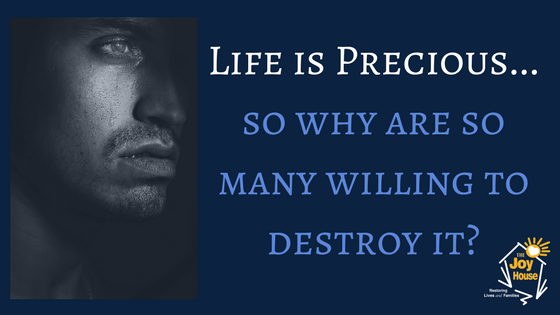Life is a Gift: Understanding and Preventing Suicide
 By: Garry Barber, PhD & Abby Elam, BSW
By: Garry Barber, PhD & Abby Elam, BSW
Suicide is one of the greatest tragedies facing our world today, and no individual or community is exempt from this epidemic of despair. Parents, spouses, children, church members, classmates, coworkers, and neighbors are all too often left with the haunting question of “WHY?” 40,000 – 50,000 deaths occur nationwide each year due to self-induced, life-ending action. The issues involved in such a decision are far too complex to allow for complete answers (especially since the only one who could truly provide an answer has permanently silenced him/herself). While we cannot offer concise answers, we do hope to provide insight into suicidal ideation and some recommendations for intervention.
The Downward Spiral. Rarely would a person consider taking his own life, make a plan, and carry it out in the same day. Typically, there is a process of downward spiral thinking, feeling, and believing that leads to hopeless despair resulting in the suicidal action. We believe this downward spiral begins with some type of loss, either real or perceived. Real losses may be related to job, title, social standing, wealth, health, innocence, independence, relationships, the death of a loved one or a host of other experiences. Perceived losses may include loss of importance, value, worth and identity. Either way, the significance of the loss is enough to cause the person to consider a permanent solution to the pain of such despair. Suicide then, may be described as a “catastrophic response to total despair.” (We are building here upon last month’s excellent article by Dr. Wattenbarger on the topic of despair as it appeared in Counselor’s Corner of the Joy House E News.) Such total despair is often the result of a person’s internal battle with unhealthy comparisons to those around him.
The Danger of Comparison. Unhealthy use of social media tends to deepen the hole of real and perceived losses as one observes others with happy faces, promotions, engagements, new ba bies, dream vacations and social gatherings. Too often these are perceived as indicators that others are “living their best life” all while the outside observer feels cutoff, marginalized and alone. The downward spiral intensifies being powered by increasing comparison. The result is a sense of shame that settles in and speaks of personal brokenness, emptiness and perceived worthlessness. Such comparisons lead to dark introspection pushing the sufferer still downward. One of our younger clients put it this way, “when you are in a dark place already, and then look at yourself, you never like what you see.”
bies, dream vacations and social gatherings. Too often these are perceived as indicators that others are “living their best life” all while the outside observer feels cutoff, marginalized and alone. The downward spiral intensifies being powered by increasing comparison. The result is a sense of shame that settles in and speaks of personal brokenness, emptiness and perceived worthlessness. Such comparisons lead to dark introspection pushing the sufferer still downward. One of our younger clients put it this way, “when you are in a dark place already, and then look at yourself, you never like what you see.”
How to Help. Upon recognizing that someone within your circle of care is despairing to the point of considering such a catastrophic response, we believe it is important first to LISTEN. Listening to a person includes giving the freedom to talk about their deep despair without judgement. Rebuking a hurting person for talking about their pain may only deepen the despair. The more you listen, the more they are likely to talk. Often times “keep ��em talkin’” is the best strategy for helping a person through a difficult time. It also important to RESPOND, do not overreact. Yes, every possible threat of suicide should be taken seriously. The level-headed response may include getting the person to the hospital in order to save their life in extreme circumstances. Inclusion of another trusted person or persons may also be an appropriate response. Since suicidal ideation is often the result of feeling cut off from community or support it may be that carefully including some select community would help alleviate the immediate crisis. (Caution must be employed to not include too many others or those who might overreact and cause more stress.) Third, we would suggest: BE DIRECT. Be willing to ask the tough questions and use direct language: Are you thinking about suicide? Are you planning to harm yourself? Determine to not be afraid to ask the question just because you are afraid to hear the answer. Being indirect and avoiding the issue of life and death will allow the despairing individual to hide in their pain and remain hopeless. We have also found that there are times when directly confronted with the question of suicide and given the freedom to talk it out some individuals may rethink the value of their life or reconsider the gravity of making a life-ending decision. Finally, we would point to the power of ENCOURAGEMENT. Expressing confidence in the despairing person can be an essential element in a helpful response to suicidal thinking. Empty flattery is not the answer and may only add to the despair. Encouraging may be expressed in comments like, “I am confident you are stronger than you think you are right now. I have confidence that you can face this and have better days ahead.”

The person considering suicide has reached a point at which the drive to live has been overwhelmed by the desire to be released from the pain of living. The overwhelming pains of life are made more manageable when a despairing person can sense the weight of their burdens are being shared by those who care (see Galatians 6:1-5). Psalm 139 reminds us that life, the most precious gift we have been given, was bestowed upon us at conception. As followers of Christ we must be those who value life enough to walk alongside those in despair and offer life, hope, love, community, and encouragement.

Garry Barber is a Licensed Clinical Pastoral Counselor (NCCA) who holds Masters and Doctoral degrees in both biblical studies and family counseling. For nearly 3 decades he has sought to guide individuals and families to a healthier, more functional life. Abby Elam is our Counseling Center Assistant. She has a bachelor’s degree in Social Work from Middle Tennessee State University and has spent the last several years working for different nonprofit organizations and ministries.The Joy House Counseling Center exists for the purpose of providing a faith-based option for residents of the Highway 575/ 515 corridor who seek guidance with life’s problems. We have locations in Pickens, Gilmer and Cherokee Counties with fees based on income and ability to pay. We offer counseling to all ages, from 7 to 70, with professional services to a wide variety of individuals, families and their needs. Contact our Counseling Center via phone at 678-452-2037 for more information.
Studies have shown that the risk of suicide declines sharply when people call the national suicide hotline: 1-800-273-TALK. There is also a crisis text line. The lines are staffed by a mix of paid professionals and unpaid volunteers trained in crisis and suicide intervention. The confidential environment, the 24-hour accessibility, a caller’s ability to hang up at any time and the person-centered care have helped its success, advocates say.
